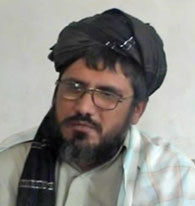Muhammad Rasul | |
|---|---|
 | |
| Supreme Leader of High Council of Afghanistan Islamic Emirate | |
| In office 2016–2021 | |
| Preceded by | Office established |
| Governor of Nimruz Province for the Islamic Emirate of Afghanistan | |
| In office 1996–2001 | |
| Succeeded by | Abdul Karim Brahui |
| Personal details | |
| Born | c. 1965 (age 59–60) Kandahar Province,Kingdom of Afghanistan |
| Religion | Islam |
| Military service | |
| Allegiance |
|
| Years of service | 1994–present |
| Rank | Marshal |
| Battles/wars | War in Afghanistan (2001–2021) Islamic State–Taliban conflict |
Muhammad Rasul was the leader of the High Council of the Islamic Emirate of Afghanistan,a Taliban dissident group in Afghanistan,until the group's dissolution in 2021. [1] He was a Taliban-appointed governor of Nimruz Province,Afghanistan. Rasul exerted pressure and suppression on Pashtun factions unpopular with the Taliban,and made a considerable fortune controlling cross-border drug-smuggling through Nimruz. [2]